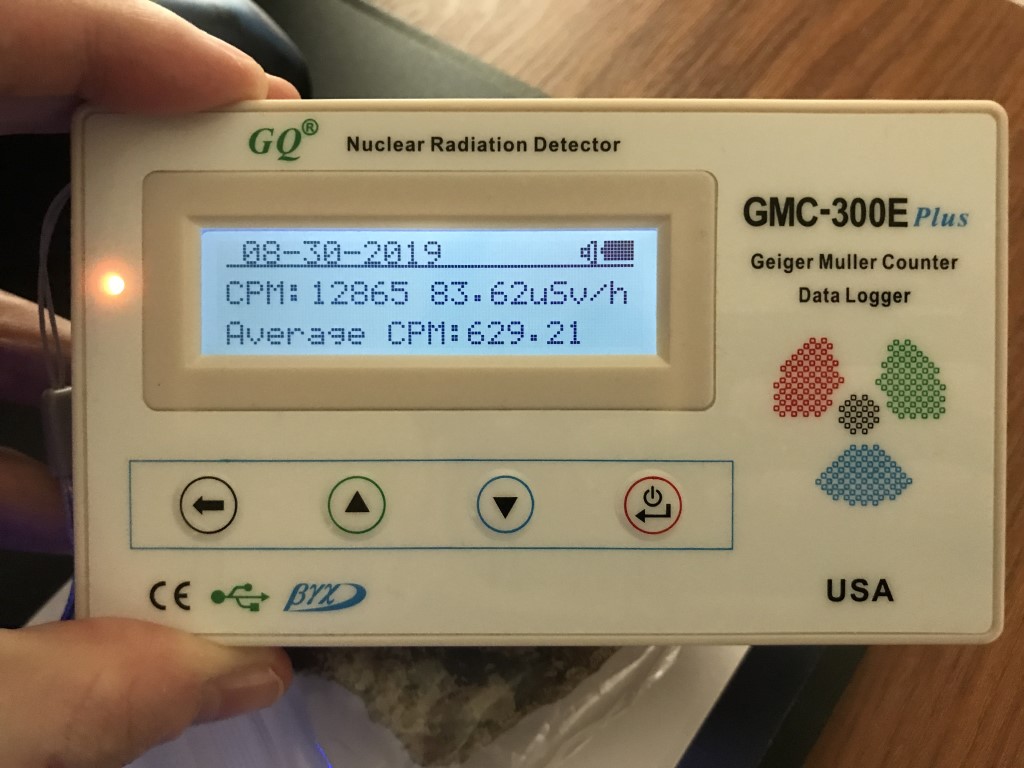| T O P I C R E V I E W |
| PKIDelirium |
Posted - 08/30/2019 : 13:32:01
A small piece of uranium ore I had previously bought wasn't giving me a particularly good reading because of the small surface area, so I bought a 180 gram piece of uraninite/pitchblende. This was rated at a max of 65,000 CPM with an SEI Inspector pancake probe in direct contact! With the 300E+ directly on the plastic bag it's in, the readings are quite impressive, even causing the Average CPM to get a little confused and fluctuate around between 20 and the highest reading so far, seen in the photo.
Currently, with the counter over a foot away from the sample, I'm maintaining between 45 and 60 CPM, when my usual background is around 25. Now I just need to find a safe way to store this bad boy!
Image Insert:

129863 bytes |
| 5 L A T E S T R E P L I E S (Newest First) |
| EmfDev |
Posted - 09/04/2019 : 09:10:35
Yea it's better to put it in view since it's mildly radioactive (in your case less radiation than background) and looks good. It looks like it doesn't belong to those in that metal box. |
| PKIDelirium |
Posted - 09/03/2019 : 18:29:32
I have a solid metal banker's box that all my samples are stored in. Gamma isn't much of a factor with uranium ore, even pitchblende, and the metal is thick enough to block the beta. Each item is either in a plastic bag wrapped with layers of foil inside the box, or in a small glass specimen vial.
The Trinitite that came today doesn't even register above normal background through the plastic, so it's in a separate place to avoid being damaged inside the metal box since it is rather fragile. I might get a small glass display box for it, it's quite interesting to look at because of the greenish crystallization. |
| EmfDev |
Posted - 09/03/2019 : 09:48:33
Nice looks interesting to collect those things. But dangerous. |
| PKIDelirium |
Posted - 08/30/2019 : 16:51:17
I wasn't getting anywhere near the verified activity on the small nickel-size piece of ore because the surface area was just too small, and the actual uranium more scattered around within it. It's much more concentrated with pitchblende, and this sample is almost the size of the counter with a nice yellow stripe of concentration on one side.
Scientific curiosity, I take the proper precautions like not touching the samples with bare hands and using shielding for storage.
The sound from the 300E+ was very impressive with this one, reaching full "static noise" level. The seller of this particular sample had registered a max of 65,000 CPM using a pancake probe with an open alpha window, so it's quite the hot piece!
I'll have a small sample of Trinitite soon, it'll be interesting to see what the activity from it is, considering it's a result of thermal "glassing" of rock and sand from the Trinity nuclear test program performed in New Mexico in 1945. Certainly nowhere near the activity of this pitchblende though, more of an interesting collector's piece. |
| EmfDev |
Posted - 08/30/2019 : 15:19:17
What do you mean by good reading? What are you going to use those rocks for?
Anyway the reading looks pretty high! |
|
|

